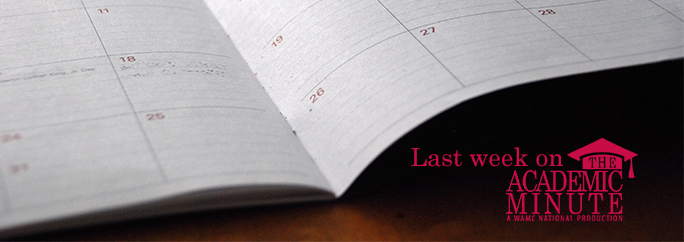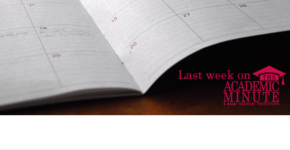
The Academic Minute from 09.12 – 09.16
Monday, September 12th
Aviva Philipp-Muller – Simon Fraser University
Why are People Anti-Science and What Can We Do About It?
Aviva Philipp-Muller is an Assistant Professor of Marketing at the Beedie School of Business at Simon Fraser University. Dr. Philipp-Muller’s research investigates attitude strength, persuasion, and consumer behavior. Specifically, she focuses on 1) consumer well-being and ethical consumption, 2) consumer responses to persuasion. Dr. Philipp-Muller’s research has appeared in leading marketing and psychology journals, such as the Journal of Consumer Research, Psychological Science, and the Journal of Experimental Social Psychology. Dr. Philipp-Muller received her PhD in psychology from The Ohio State University, and holds an M.A. from Ohio State University as well as a B.Sc. from the University of Toronto.
Tuesday, September 13th
Markus Baer – Washington University in St. Louis
How Awards and Recognition Can Decrease Creativity
Markus Baer, Ph.D. ([email protected]) is an award-winning scholar and teacher. Currently, he is Professor of Organizational Behavior at the Olin Business School, Washington University in St. Louis. Markus studies innovation and all its related activities and his work has been published in the leading management journals. He is an acclaimed teacher and has received accolades for his teaching from the Olin Business School, where he won consecutive teaching awards, and internationally as one of the world’s top 40 business professors under 40. He has taught a world-wide audience of students and executives. Internationally, he has given more than 50 invited research presentations both in university and non-university settings, and he is a frequent presenter and panelist at international research conferences.
Wednesday, September 14th
Dylan Roby – University of California, Irvine
The Association Between COVID-19 Mortality and the County-Level Partisan Divide in the United States
A leading expert in health policy, Dylan H. Roby, PhD, associate professor of health, society, and behavior at the University of California, Irvine Program in Public Health, has over 25 years of expertise in health policy research, reform, and capacity-building in settings from Capitol Hill to academia. He has dedicated his career to addressing disparities in health care outcomes and focuses his research primarily on the health policy impacts on underserved populations, namely those served by public hospitals, community health centers, and Medicaid.
Thursday, September 15th
Alicia Walf – Rensselaer Polytechnic Institute
Stress and Procrastination
Alicia Walf is a neuroscientist and senior lecturer at Rensselaer Polytechnic Institute whose research interests are fueled by the broad question: Why are there individual differences in stress? This question led to studying hormones’ actions for growth and plasticity in the brain and body. She has since refined her pursuit to include consideration of body, brain, and mind relationships as they relate to memory, perception, social cognition and emotions. Dr. Walf has taken a cross-species and cross-discipline approach in her work. Dr. Walf’s studies of effects and mechanisms of stress and well-being often occur in the “wild,” such as in architectural built environments, artistic installations, interactions with technology, contemplative practices, conference rooms, and classrooms.
Friday September 16th
Dennis Jett – Penn State University
Peacekeeping: Its Complicated
Dennis Jett is a professor and founding faculty member at the School of International Affairs at Penn State. A former career diplomat, he served as ambassador to Mozambique and Peru, on the National Security Council, and in Liberia, Malawi, Israel, and Argentina. He has written four books, including “Why Peacekeeping Fails” and is a member of the Council on Foreign Relations and the American Academy of Diplomacy.
